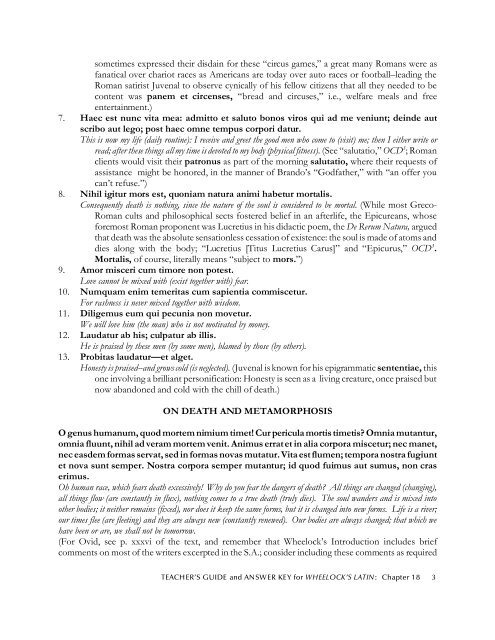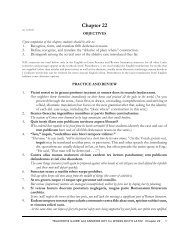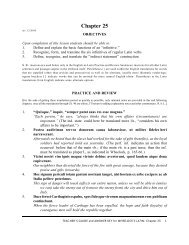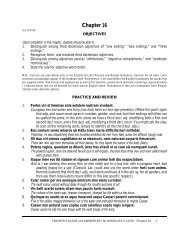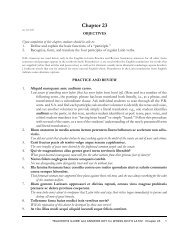Chapter 18
Chapter 18
Chapter 18
Create successful ePaper yourself
Turn your PDF publications into a flip-book with our unique Google optimized e-Paper software.
sometimes expressed their disdain for these “circus games,” a great many Romans were as<br />
fanatical over chariot races as Americans are today over auto races or football–leading the<br />
Roman satirist Juvenal to observe cynically of his fellow citizens that all they needed to be<br />
content was panem et circenses, “bread and circuses,” i.e., welfare meals and free<br />
entertainment.)<br />
7. Haec est nunc vita mea: admitto et saluto bonos viros qui ad me veniunt; deinde aut<br />
scribo aut lego; post haec omne tempus corpori datur.<br />
This is now my life (daily routine): I receive and greet the good men who come to (visit) me; then I either write or<br />
read; after these things all my time is devoted to my body (physical fitness). (See “salutatio,” OCD 3 ; Roman<br />
clients would visit their patronus as part of the morning salutatio, where their requests of<br />
assistance might be honored, in the manner of Brando’s “Godfather,” with “an offer you<br />
can’t refuse.”)<br />
8. Nihil igitur mors est, quoniam natura animi habetur mortalis.<br />
Consequently death is nothing, since the nature of the soul is considered to be mortal. (While most Greco-<br />
Roman cults and philosophical sects fostered belief in an afterlife, the Epicureans, whose<br />
foremost Roman proponent was Lucretius in his didactic poem, the De Rerum Natura, argued<br />
that death was the absolute sensationless cessation of existence: the soul is made of atoms and<br />
dies along with the body; “Lucretius [Titus Lucretius Carus]” and “Epicurus,” OCD 3 .<br />
Mortalis, of course, literally means “subject to mors.”)<br />
9. Amor misceri cum timore non potest.<br />
Love cannot be mixed with (exist together with) fear.<br />
10. Numquam enim temeritas cum sapientia commiscetur.<br />
For rashness is never mixed together with wisdom.<br />
11. Diligemus eum qui pecunia non movetur.<br />
We will love him (the man) who is not motivated by money.<br />
12. Laudatur ab his; culpatur ab illis.<br />
He is praised by these men (by some men), blamed by those (by others).<br />
13. Probitas laudatur—et alget.<br />
Honesty is praised--and grows cold (is neglected). (Juvenal is known for his epigrammatic sententiae, this<br />
one involving a brilliant personification: Honesty is seen as a living creature, once praised but<br />
now abandoned and cold with the chill of death.)<br />
ON DEATH AND METAMORPHOSIS<br />
O genus humanum, quod mortem nimium timet! Cur pericula mortis timetis? Omnia mutantur,<br />
omnia fluunt, nihil ad veram mortem venit. Animus errat et in alia corpora miscetur; nec manet,<br />
nec easdem formas servat, sed in formas novas mutatur. Vita est flumen; tempora nostra fugiunt<br />
et nova sunt semper. Nostra corpora semper mutantur; id quod fuimus aut sumus, non cras<br />
erimus.<br />
Oh human race, which fears death excessively! Why do you fear the dangers of death? All things are changed (changing),<br />
all things flow (are constantly in flux), nothing comes to a true death (truly dies). The soul wanders and is mixed into<br />
other bodies; it neither remains (fixed), nor does it keep the same forms, but it is changed into new forms. Life is a river;<br />
our times flee (are fleeting) and they are always new (constantly renewed). Our bodies are always changed; that which we<br />
have been or are, we shall not be tomorrow.<br />
(For Ovid, see p. xxxvi of the text, and remember that Wheelock’s Introduction includes brief<br />
comments on most of the writers excerpted in the S.A.; consider including these comments as required<br />
TEACHER’S GUIDE and ANSWER KEY for WHEELOCK’S LATIN: <strong>Chapter</strong> <strong>18</strong> 3


